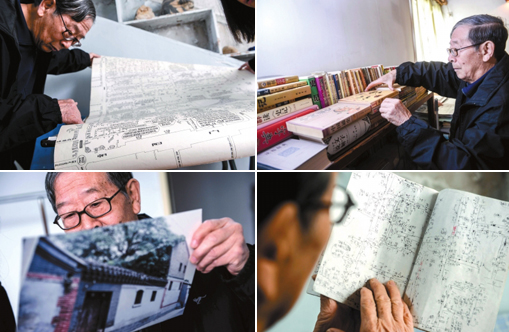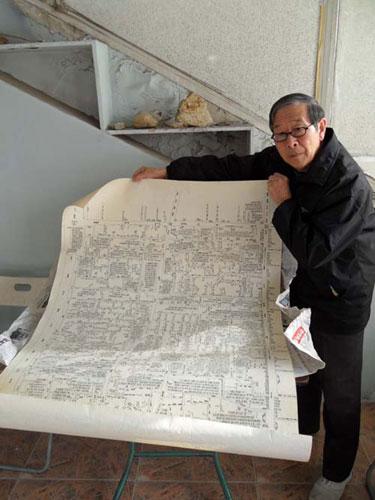82-year old man recording Beijing's hutongs

 0 Comment(s)
0 Comment(s) Print
Print E-mail CNTV, February 4, 2014
E-mail CNTV, February 4, 2014
In recent weeks, we've been reporting on Beijing's disappearing hutongs - the traditional alleyways and courtyard houses that were once the mainstay of the capital. But some are shrinking so fast, recording them is proving a challenge. CCTV's Grace Brown spoke to one man who has dedicated nearly three decades of his life to mapping them, with pen and paper.
 |
|
82-year old Shu Liao isn't your average senior citizen. For one, he's still working. |
82-year old Shu Liao isn't your average senior citizen. For one, he's still working. And with painstaking attention to detail, despite his poor sight. For more than 26 years, he's been mapping Beijing's vanishing hutongs by hand - drawing every alley and house down, almost, to the last nook and cranny.
"I was born in Beijing. I believe Hutongs are important, filled with culture and history - so much history. Then, I decided to document them. After I stopped working, I didn't retire. I get up everyday - no later than 5am - to go out to the hutongs and record them." Shu Liao said.
It took Shu - a former train driver - 15 years to draw the rough sketches in these books, which he recorded step by step as he walked through them. It took him another 8 years to put them onto this map. An effort to preserve his city's past. Time isn't the only challenge. Once, he says, he was mistaken for a robber and held by police.
China's rapid growth and urbanization are transforming its landscape. As new buildings grow bigger and taller, traditional areas like this are becoming increasingly rare. In recent decades, hundreds of Beijing's hutongs have been totally destroyed. Many more are only just standing, barely surviving between the skyscrapers.
According to one survey of more than 1,300 hutongs in 2006, just one third of Beijing's original hutongs still exist. It says 15 percent were totally demolished While 52 percent were severely damaged - meaning some only have a few houses left.
Residents of this hutong say their neighbourhood, is now much smaller.
"I was born in this hutong. I've lived here 50 years. This place has changed a great deal: across the street was once another hutong. Now, it's an international finance
For Shu, changes like this make capturing hutongs on paper and in photographs, even more important.
"I record hutongs because while I can't control whether or not they are destroyed, I can at least record them for future generations, to let them see what it was like." Shu Liao said.
As urbanization gains further steam - bringing with it more migrants - the permanence of these small and aging streets is likely to be tested even more. But with Shu's decades of dedication, their fate may be harder to ignore.






Go to Forum >>0 Comment(s)